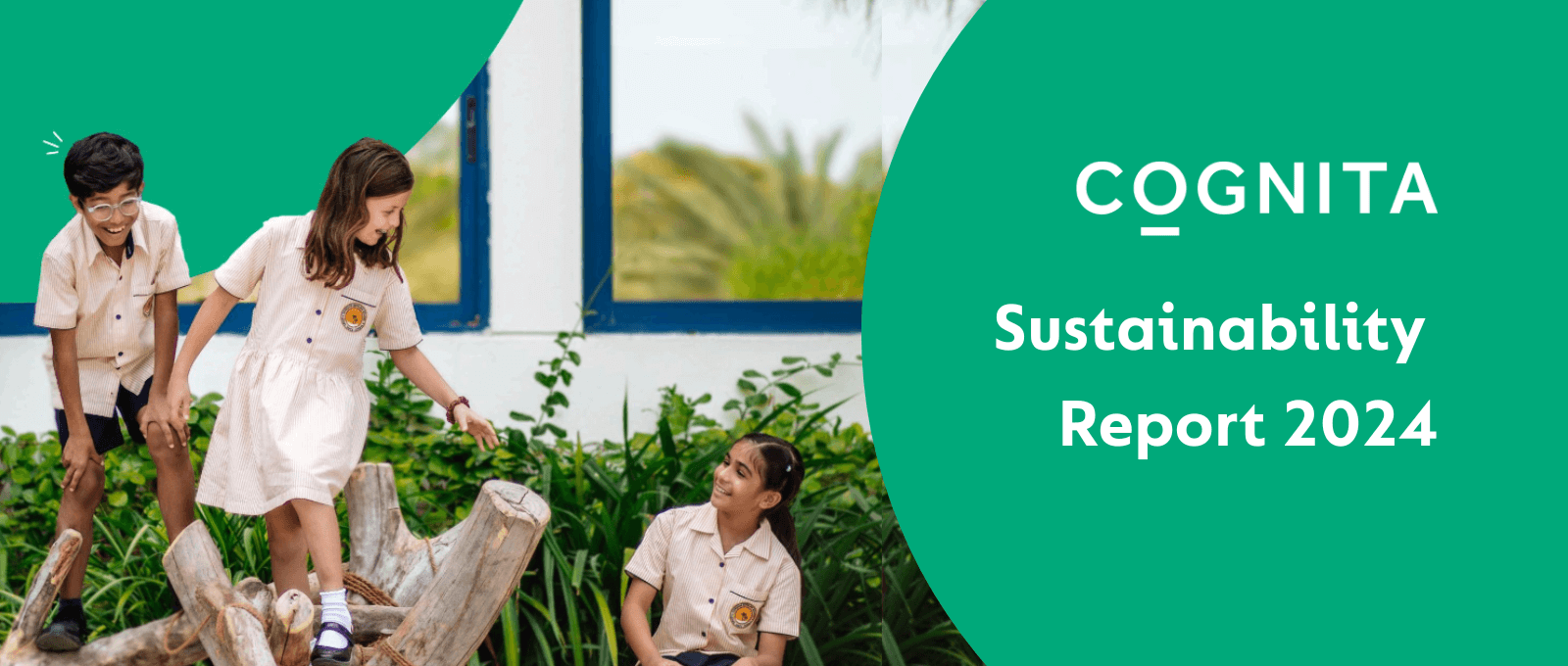3 July 2025
Educating for Impact: Cognita’s Vision for a Sustainable Future
 At Cognita, we embed sustainability in everything we do – from building environmentally responsible operations, to fostering inclusive learning environments and empowering our students to lead positive change. We sat down with Jamie Delaney, our Head of ESG and Group Ethics & Compliance Officer, and discussed Cognita’s wide-ranging ESG initiatives, their growing impact, and what’s next on our journey.
At Cognita, we embed sustainability in everything we do – from building environmentally responsible operations, to fostering inclusive learning environments and empowering our students to lead positive change. We sat down with Jamie Delaney, our Head of ESG and Group Ethics & Compliance Officer, and discussed Cognita’s wide-ranging ESG initiatives, their growing impact, and what’s next on our journey.
Can you tell us briefly what Cognita’s main ESG aims are – and why, as a global schools group, you are committed to these goals?
Over the last few years, we’ve developed an approach to sustainability that focuses on four key areas: creating sustainable learning environments, nurturing responsible learners (our students), looking after our colleagues, and having a wider impact on education globally. Being a leading global schools group, we feel a keen responsibility to use our scale and reach to benefit others and advance sustainability.
For example, as educators to more than 95,000 children worldwide, we have a chance to cultivate sustainability in the curriculum and shape the next generation of responsible citizens and future leaders. At the same time, our global presence means we can drive systemic change across our group, from transitioning to clean energy and reducing waste – to creating meaningful, local impact in the communities we serve. So what we’re doing reflects our belief that education has a responsibility to help create a more sustainable world.
Looking back over the past year, what would you say has been Cognita’s most significant ESG milestone?
One milestone that we’ve been very proud of in 2025 is the launch of Cognita Impact. This is a dedicated initiative to build on our successful regional partnerships – like our collaboration with The Sparkle Foundation in Malawi – and to scale them across the group in a way that multiplies positive impact. It’s a way of turning our ESG strategy into action across all regions and connecting our global endeavours for the benefit of others. Our ambition is that for every child we educate at Cognita, we positively impact the life of another – reaching 100,000 children by 2035.
This is some of the important work we’re doing at the level of concrete impact. But in terms of the group picture and how we measure our ESG activity, we’re also making big strides. During the last year we have launched our first group-wide ESG targets, as well as making a significant improvement in our Sustainalytics ESG Risk Rating and earning a spot among the top 10 global companies in our sector. So it’s been a very successful 12 months for us on that front as well.
How is Cognita empowering its students to make a positive impact, particularly in becoming responsible citizens and future ESG leaders?
Our biggest initiative when it comes to empowering students is our Sustainability Action Framework – a practical guide to help individual schools turn sustainability ambitions into real, tangible actions. Student leadership is a key part of the Framework.
So far, we’ve seen great results using the Framework to help schools reduce their environmental impact. By the end of the 2023/2024 academic year, Horizon English School in Dubai had successfully introduced a waste monitoring system. In the UK, Downsend School and North Bridge House Hampstead achieved impressive reductions in general waste – by 20% and 30% respectively. Meanwhile, St. Andrews International Dusit in Bangkok, El Limonar International School Murcia in Spain, and NBH Hampstead all reported significant, measurable decreases in food waste – by 9%, 16% and 30% respectively.
Beyond the Sustainability Action Framework, Cognita events like Global Be Well Day involve students in initiatives centred around giving and wellbeing, demonstrating that social responsibility is integral to personal development.
Which student-led ESG initiatives have really stood out?
For me, our Cognita Student Challenge was the stand-out student initiative of the last year. In the 2024 contest, students could submit a project that focused on either Digital Innovation or Making a Difference. While both aspects are important individually, I learned from some of the Student Challenge projects how deeply intertwined with each other they are. For instance, students at Instituto GayLussac in Brazil were working towards creating computer vision glasses for the visually impaired using artificial intelligence – beautifully illustrating how technology can be a powerful tool that makes a real difference. And that’s just one instance of the creativity, empathy, and leadership our students have shown.
How is Cognita engaging with and supporting local communities through its ESG efforts?
One of the best examples of how we’re supporting communities around the world is the Amparo Programme – a scholarship initiative that provides high-quality education to vulnerable children from the most economically disadvantaged families in Colombia – delivered through our strategic partnership with nine Redcol schools.
As part of the Amparo Programme, Redcol provides four full scholarships at each of their schools every academic year, which give six- and seven-year-olds a place at a Redcol school for their entire academic journey. Scholarship recipients receive board, transportation, school supplies, uniforms, books and technology, meals, tutoring, exam fees and help from the Learning Support Center – while their families also receive support as part of the model. As of the beginning of the 2024-2025 academic year, 166 students have been accepted as part of the Amparo Programme, and we hope to reach 600 in this way in the future.
What steps is Cognita taking to support staff wellbeing and foster professional development?
Creating fair and sustainable workplaces is a key priority for us, and that’s why we continue to invest in professional development, leadership training and employee wellbeing. To monitor our success in this, we hold an annual staff survey to find out how they think we are doing. Our most recent survey in 2024 had an 87% response rate, and showed improvements across several job-satisfaction measures such as work/life balance and professional development – with over 80% of respondents agreeing that Cognita fosters a culture of care and support. On top of these improvements, we’ve also taken action to make our recruitment methods fairer with new global guides on inclusive recruitment and internal hiring.
What does the future look like for Cognita in terms of ESG? What are Cognita’s key priorities and upcoming plans in the ESG space?
Between now and 2030, Cognita aims to embed ESG even deeper into the operational running of our schools: this will better empower our students, support our people, and scale our global impact. Over the next five years, we aim to expand Cognita Impact to all regions of the globe, advance towards our Net Zero roadmap, and support every school to adopt and embed our Sustainability Action Framework. To promote staff wellbeing and development, we also aim to launch a strategic ‘Leading Employer’ roadmap by 2026 that will enhance our colleague experience.
Beyond all these initiatives, we will also stay focused on leading responsibly, reducing our footprint, and ensuring that every single Cognita student graduates with the mindset and skills to think sustainably and globally.
It’s a truly exciting time at Cognita as we bring our commitments to life. There is so much more to come, and I am excited to share our progress over the coming months and years.


